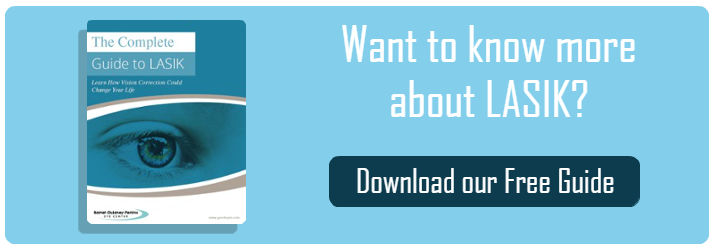If your vision is affecting the quality of your life or your ability to fulfill work responsibilities, you may have already considered LASIK laser eye surgery. This advanced procedure was approved in the U.S. in 1999, allowing thousands of individuals to enjoy a marked improvement in eyesight, their ability to perform work along with an improvement to the quality of their lives.
The treatment is performed by an ophthalmologist who creates a thin flap in the cornea using a laser or blade. The LASIK surgeon then removes corneal tissue under the flap, places the flap back over the eyeball where it’s allowed to heal naturally.
The American Association of Ophthalmology says more than 90 percent of patients who’ve had a LASIK operation report a significant increase in eyesight, between 20/20 and 20/40 vision without glasses or contact lenses.
This article details 8 of the top questions to ask about LASIK to help determine whether the procedure will get you the desired results.
Top Questions About LASIK

1. What results can I expect?
After an exam, your eye doctor will know whether your level of nearsightedness, farsightedness and type of astigmatism will respond well to LASIK. These eye conditions are caused by refractive error, which is characterized by the shape of the eye not allowing the light to focus on the retina, causing images to appear blurred. Severe refractive errors don’t respond as well to LASIK as moderate to lower-level conditions. However, alternatives such as the ICL Implantable Contact Lens may be an alternate option.
2. Are there potential risks of LASIK eye surgery?
LASIK is a popular procedure with very high success rates. Most patients see positive results from LASIK quickly. But everyone responds differently. It is normal to have blurriness, light sensitivity, tearing and mild discomfort right after surgery. Additionally, one of your eyes could heal faster than the other. By following your post-operative instructions and attending your follow-up visits your eye doctor can ensure your healing in on track. Dry eye syndrome is common after LASIK due to decreased tear production. Your eye doctor may recommend lubricating eye drops or other solutions to assist with dry eye symptoms. Infections or complications are rare but possible. Ask your LASIK surgeon to discuss the risks and benefits with you in detail.
3. Will my age be a factor in the success of LASIK eye surgery?
LASIK is FDA-approved for patients who are 18 or older. Although age alone doesn’t necessarily influence procedure success, some doctors feel the ideal patient is between 35 and 55.
4. Do I have a health condition that might rule out this procedure?
Certain conditions, such as diabetes, autoimmune diseases, certain eye injuries and eye disease may rule out LASIK. Your surgeon will be able to provide you with expert insight after a comprehensive LASIK evaluation.
5. Will the results last for life, or will I need another LASIK eye operation later?
After they’ve healed from surgery, your eyes will continue to age throughout your life, so it’s possible you may need retreatment. Other factors, such as a high refractive error or older age may increase the possibility of LASIK retreatment.
6. Are there medications I should stop taking before the surgery?
This is an important question to ask your doctor if you are taking any prescribed or over-the-counter medications. Your doctor may recommend you halt specific medications, such as Accutane and anti-histamines.
7. How long will it take me to recover from the operation?
In general, you’ll be able to see well enough to perform everyday tasks within a few days. Your sight may appear blurry after the surgeon removes the eye shield, but that should clear up within a few days and your vision will gradually improve. It could take several weeks to fully recover and several months to experience the complete benefits of the procedure.
In addition to asking your surgeon about recovery time, you can also get an idea of what to expect after LASIK surgery.
8. In my case, is there an alternate treatment option you would recommend?
If your LASIK surgeon says your results won’t be as great as you’d like or if you feel that the risks aren’t worth the benefits, they may be able to suggest a procedure that is better suited to you. There are some non-invasive eye corrective options, but they are usually for individuals with minor refractive errors.
Your sight contributes greatly to your quality of life and ability to live independently. To protect your sight, arm yourself with information and always place your trust in proven professionals like the ophthalmologists at Barnet Dulaney Perkins Eye Center.


